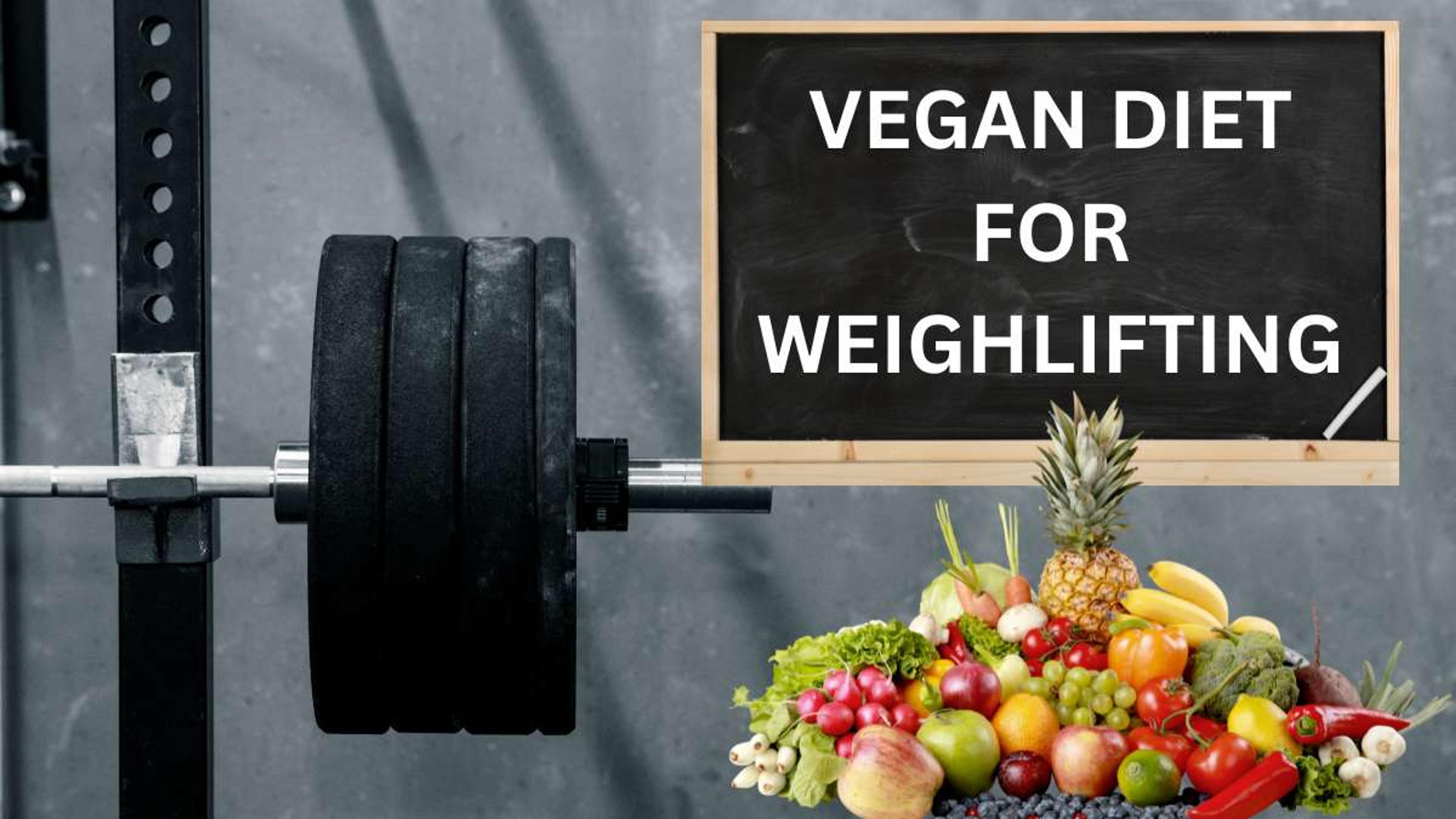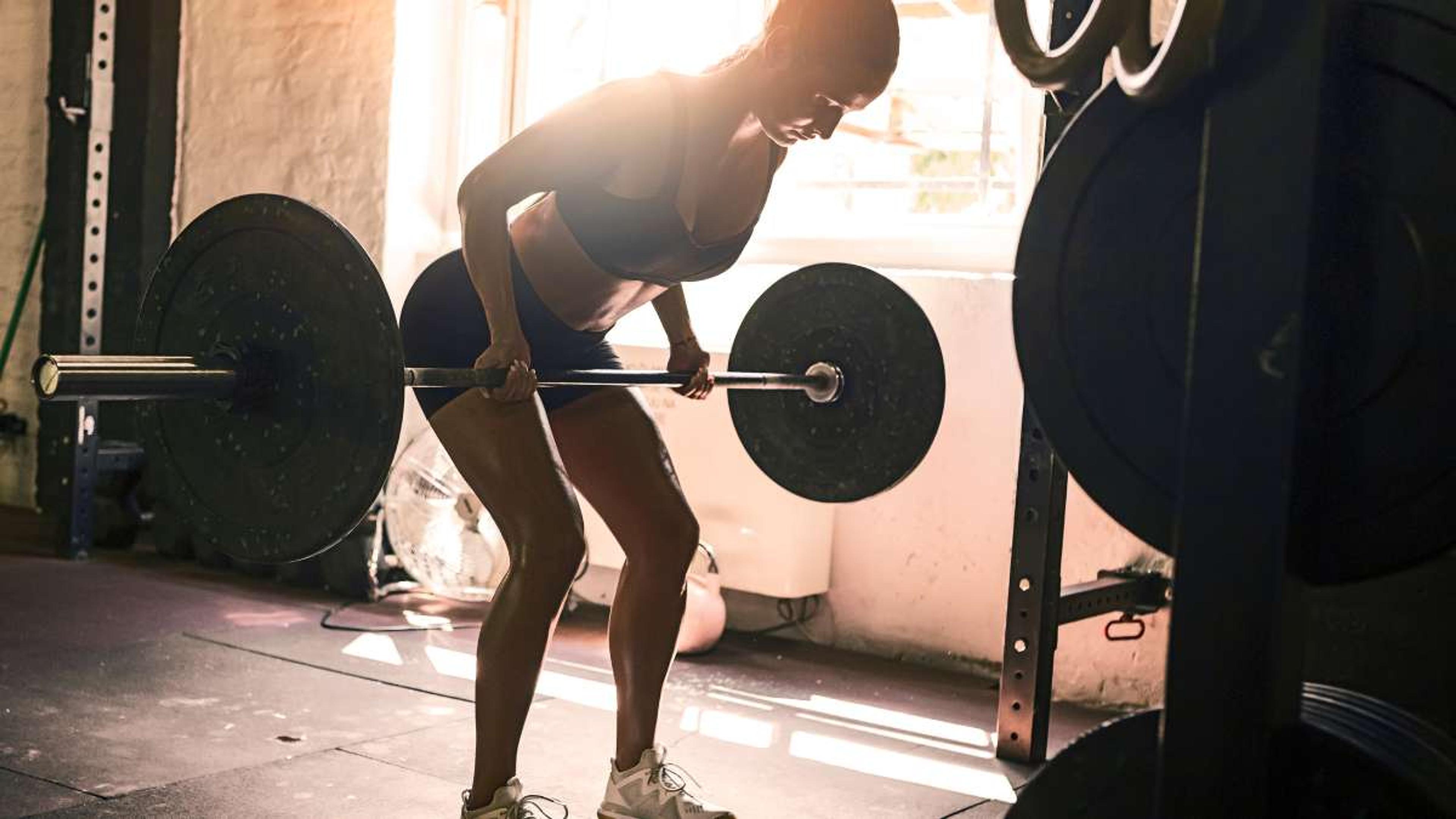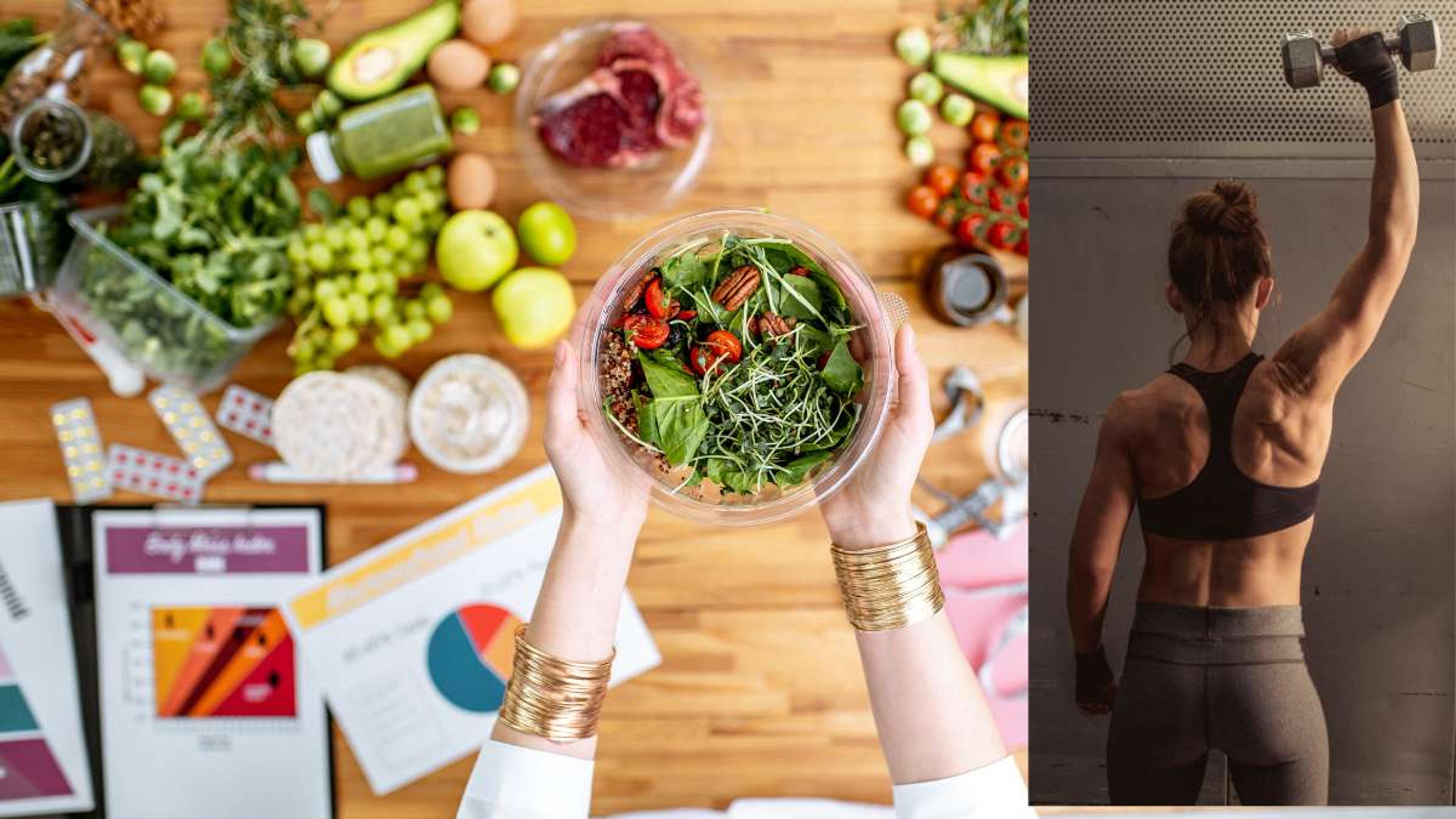Fuel Your Workouts with Vegan Diet for Weightlifting

- Key Takeaways
- The Benefits of a Vegan Diet for Weightlifting
- Key Nutrients for Vegan Weightlifters
- Designing a Vegan Meal Plan for Weightlifting
- Addressing Potential Challenges and Concerns
- Sample 5 day meal plan to meet protein and energy needs
- Conclusion
- FAQs
Building muscle while maintaining a vegan diet can be tricky, but it's far from impossible. Recent studies show that with the right nutrients and meal plans, you can successfully gain strength and muscle mass on a plant-based diet.
This blog will guide you through effectively achieving your weightlifting goals without relying on animal products, by focusing on key vegan foods and strategies for optimizing nutrition.
Ready to change your game?
Key Takeaways
- A vegan diet for weightlifting can improve cardiovascular health, reduce the risk of chronic diseases, and enhance athletic performance.
- Key nutrients for vegan weightlifters include protein (from sources like legumes and tofu), carbohydrates (from whole grains, fruits, and vegetables), healthy fats (from nuts, seeds, and avocados), as well as essential micronutrients like iron, calcium, vitamin B12, and omega-3 fatty acids.
- Designing a vegan meal plan for weightlifting involves incorporating high-protein meals and snacks, proper pre-workout and post-workout nutrition with a focus on carbohydrates and protein intake, adequate hydration throughout the day to support performance. It is important to address potential challenges by avoiding nutrient deficiencies through supplementation if necessary.
The Benefits of a Vegan Diet for Weightlifting
A vegan diet for weightlifting offers improved cardiovascular health and reduced risk of chronic diseases, while also enhancing athletic performance.

Improved cardiovascular health
A vegan diet can work wonders for your heart while also fueling your weightlifting goals. Consuming plant-based foods has been linked to lower cholesterol levels which, in turn, reduces the risk of developing cardiovascular disease.
This is a significant advantage for weightlifters as it enhances overall performance and lowers chances of injury. The low-fat characteristic of vegetarian diets promotes good heart health by improving blood circulation and reducing potential blockages caused by saturated fats found commonly in non-vegan sources.
Furthermore, adhering to a healthy plant-based diet can also decrease mortality from such diseases, paving the way for a longer and healthier life along with improved athletic performance.
Reduced risk of chronic diseases
Adopting a vegan diet aids significantly in decreasing the risk of various chronic diseases. Higher adherence to this plant-based nutrition course is associated with less chance of cardiovascular disease mortality, as studies consistently show.
A diet free from animal products introduces a wealth of health benefits and staves off conditions like metabolic syndrome (MetS).
Switching to plant-based foods doesn't just improve heart health, it also diminishes the threat posed by several other degenerative conditions such as. diabetes, obesity, and certain types of cancer.
Contrary to popular belief, a vegan diet can Many observational evaluations link vegans to possessing lower risk factors for heart disease compared to individuals who consume meat or dairy.
Chronic illness prevention becomes more feasible with vegetarian diets as they are loaded with nutrients essential for maintaining optimum body functions and fostering immunity against diseases.
Enhanced athletic performance
A plant-based diet significantly boosts athletic performance. Numerous weightlifters attribute their enhanced strength and endurance to vegan foods, which provide a rich source of vitamins, minerals and antioxidants.
This bounty of nutrients creates leaner bodies, making athletes more efficient in their sport.
With lower body fat and higher carbohydrate consumption, vegan athletes often exhibit increased stamina and improved muscle growth. The higher your muscle mass, the better you perform in weightlifting - an advantage many link to the protein-rich legumes and tofu staples in a vegan diet.
Regular intake of such plant-based proteins helps sustain energy levels during intense workouts while assisting with post-exercise recovery. An engaging variety of meals full of peas, spinach or oatmeal can have profound effects on overall athletic ability too! Additionally, the low-fat aspect of a vegan diet supports heart health – crucial for maintaining physical exertion without risk or fatigue.
Key Nutrients for Vegan Weightlifters
Vegan weightlifters need to ensure they are getting sufficient amounts of key nutrients such as protein, carbohydrates, healthy fats, and essential micronutrients like iron, calcium, vitamin B12, and omega-3 fatty acids.

Protein sources: Legumes, Tofu, Tempeh, Seitan
Incorporating legumes, tofu, tempeh, and seitan into your vegan diet as protein sources is essential for weightlifters. These plant-based foods provide the necessary amino acids that aid in muscle growth and repair after intense workouts. Legumes like lentils, chickpeas, and black beans are not only rich in protein but also contain fiber, which aids in digestion and keeps you feeling full for longer.
Tofu and tempeh are fantastic options as they are versatile and can be used in a variety of dishes. They are packed with protein while being low in saturated fat, making them ideal for maintaining a healthy weight. Seitan, made from wheat gluten, is another excellent source of protein and offers a meat-like texture that can be satisfying for weightlifters.
Carbohydrates: Whole grains, Fruits, Vegetables
Carbohydrates play a crucial role in providing energy and endurance for weightlifting. Vegan weightlifters can meet their carbohydrate needs through a variety of plant-based sources, including:
- Whole grains: Foods like quinoa, brown rice, oats, and whole grain bread provide complex carbohydrates that release energy slowly and sustainably.
- Fruits: Bananas, apples, berries, kiwi, and other fruits are excellent sources of natural sugars and carbohydrates that can fuel workouts.
- Vegetables: Leafy greens like spinach and kale, as well as starchy vegetables like sweet potatoes and squash, offer valuable carbohydrates along with essential vitamins and minerals.
Healthy fats: Nuts, Seeds, Avocados
Nuts, seeds, and avocados are considered healthy fats for vegan weightlifters. These foods provide essential nutrients and contribute to a well-rounded vegan diet for weightlifting. They are rich sources of monounsaturated and polyunsaturated fats, which are beneficial for heart health and can help reduce cholesterol levels. Including nuts, such as almonds or walnuts, seeds like chia or flaxseeds, and avocados in daily meals can provide the body with a good amount of healthy fats. These fats also aid in the absorption of fat-soluble vitamins and help maintain hormone balance.
Micronutrients: Iron, Calcium, Vitamin B12, 0mega-3 fatty acids
Vegan weightlifters need to ensure they are getting enough micronutrients for optimal performance and recovery. Key micronutrients to pay attention to include:
- Iron: Important for oxygen transport in the body and proper muscle function. Good vegan sources of iron include legumes, tofu, tempeh, and leafy green vegetables like spinach.
- Calcium: Essential for strong bones and muscle contractions. Vegans can get calcium from sources such as fortified plant-based milks, tofu made with calcium sulfate, and leafy greens like broccoli.
- Vitamin B12: Crucial for nerve function and red blood cell production. Since vitamin B12 is mainly found in animal products, vegans may need to supplement or consume fortified foods like nutritional yeast or plant-based milks.
- Omega-3 fatty acids: Play a role in reducing inflammation and supporting brain health. Vegan sources of omega-3s include flaxseeds, chia seeds, hemp seeds, and walnuts. However, it may be necessary for vegan athletes to consider algae-based supplements for sufficient intake.
Designing a Vegan Meal Plan for Weightlifting
Design a high-protein meal plan with proper pre and post-workout nutrition, including hydration and fluid intake for optimal performance.

High-protein meals and snacks
Vegan weightlifters can benefit from consuming high-protein meals and snacks to support muscle growth and recovery. Here are some options to consider:
- Tofu scramble with vegetables: Tofu is a versatile protein source that can be seasoned and cooked with vegetables like spinach, bell peppers, and onions.
- Quinoa salad with chickpeas: Quinoa is a complete protein and pairs well with chickpeas, which are packed with fiber and protein.
- Lentil soup with whole grain bread: Lentils provide a good amount of protein and can be combined with hearty vegetables like carrots, celery, and tomatoes for a nutritious meal.
- Protein smoothie: Blend together plant-based protein powder, almond milk, frozen fruits like berries or bananas, and a tablespoon of nut butter for a quick and satisfying post-workout snack.
- Peanut butter on whole grain crackers: Peanut butter is not only delicious but also a great source of protein. Spread it on whole grain crackers for an easy on-the-go snack.
- Roasted chickpeas: These crunchy snacks are easy to make by tossing rinsed chickpeas in olive oil, salt, and your choice of spices before roasting them in the oven.
- Edamame: Enjoy these steamed young soybeans as a snack or add them to salads for an extra boost of protein.
Proper pre-workout and post-workout nutrition
Proper pre-workout and post-workout nutrition is crucial for vegan weightlifters. Here are some key considerations:
- Fuel your body with carbohydrates: Consuming complex carbohydrates before a workout provides sustained energy, while simple carbohydrates can be beneficial for quick energy. Opt for sources like whole grains, fruits, and vegetables.
- Prioritize protein intake: Protein is essential for muscle repair and growth. Include plant-based protein sources such as legumes, tofu, tempeh, and seitan in your pre-workout and post-workout meals or snacks.
- Don't forget about fats: Healthy fats aid in nutrient absorption and provide additional calories. Incorporate sources like nuts, seeds, and avocados into your pre-workout or post-workout meal.
- Adequate hydration: Hydration is important for optimal performance. Drink water before, during, and after your workout to replenish fluids lost through sweat.
- Consider timing: Aim to consume a balanced meal or snack containing carbohydrates and protein 1-3 hours before your workout. After exercising, refuel within 30 minutes to an hour with a combination of carbohydrates and protein to support muscle recovery.
Hydration and fluid intake
Proper hydration and fluid intake are crucial components of a vegan meal plan for weightlifting. It is important to consistently stay hydrated throughout the day, rather than trying to catch up on fluids all at once.
One way to ensure you are getting enough fluids is by investing in a water bottle that you love and carrying it with you wherever you go. This will remind you to drink regularly and help maintain your hydration levels.
Staying properly hydrated supports overall athletic performance and can contribute to better muscle function during workouts. So make sure you prioritize hydration as part of your vegan weightlifting journey!
Addressing Potential Challenges and Concerns
To ensure a vegan diet is suitable for weightlifting, it's crucial to address potential challenges and concerns.

Avoiding nutrient deficiencies
To avoid nutrient deficiencies while following a vegan diet for weightlifting, it's important to pay attention to key nutrients. One common concern is the lack of vitamin B12, omega-3 fatty acids, iron, calcium, zinc, iodine, and vitamin D in plant-based diets.
However, with proper planning and supplementation, these deficiencies can be avoided. Weightlifters on a vegan diet should ensure they are getting enough of these essential nutrients by including fortified foods or taking supplements as needed.
By educating themselves on their specific nutrient requirements and making informed food choices, weightlifters can maintain optimal health while adhering to a vegan lifestyle.
Use Supplementation if necessary
Supplementation may be necessary for vegan weightlifters to address potential challenges and concerns related to nutrient deficiencies. While a well-planned vegan diet can provide all the necessary nutrients, certain vitamins and minerals like vitamin B12, iron, calcium, and omega-3 fatty acids may be harder to obtain solely from plant-based sources.
In such cases, supplements can help ensure that vegans meet their nutritional needs for optimal performance and muscle development. It's important to consult with a healthcare professional or registered dietitian who specializes in vegan nutrition to determine which supplements are necessary based on individual requirements.
Tracking Progress and Seeking Professional Guidance
To ensure optimal results and avoid any potential pitfalls, it is important for vegan weightlifters to track their progress and seek professional guidance. Tracking progress allows individuals to monitor their muscle gains, strength improvements, and overall performance.
It also helps identify any areas that may need adjustment in the diet or training regimen. Seeking professional guidance from a sports dietician or fitness expert who specializes in vegan diets can provide valuable insight into meeting nutrient needs, ensuring proper meal planning, and addressing any concerns or challenges specific to a vegan weightlifting routine.
With their expertise, these professionals can help optimize athletic performance while maintaining a healthy plant-based lifestyle.
Sample 5 day meal plan to meet protein and energy needs
To help you out, here's a sample 5-day meal plan designed for vegan weightlifters. This plan will help you meet your protein and energy needs to support muscle development and optimal performance.
Day 1
Breakfast: Vegan protein powder, soy milk, oats, and an apple
Snack: Fruit and nut mix
Lunch: Seitan stir-fry with brown rice
Snack: Whole grain toast with avocado
Dinner: Chickpea curry and quinoa
Day 2
Breakfast: Breakfast: Tofu scramble with mixed vegetables
Snack: Protein bar
Lunch: Black bean and vegetable burrito
Snack: Vegan yogurt with seeds
Dinner: Lentil soup with whole-grain bread
Day 3
Breakfast: Quinoa porridge with fruits
Snack: Vegan protein shake
Lunch: Tempeh sandwich with a side salad
Snack: Mixed nuts and dried fruits
Dinner: Stuffed bell peppers with quinoa
Day 4
Breakfast: Smoothie with vegan protein powder, banana, spinach, and almond milk
Snack: Fruit salad
Lunch: Whole grain pasta with tofu and vegetables
Snack: Almond butter on whole grain crackers
Dinner: Black bean and vegetable stir fry
Day 5
Breakfast: Overnight oats with chia seeds, fruits, and almond milk
Snack: Protein smoothie
Lunch: Chickpea salad with avocado
Snack: Vegetable sticks with hummus
Dinner: Stir-fried tempeh with brown rice
This 5-day meal plan provides a variety of high-protein foods, carbohydrates, and healthy fats. You can quantify this plan flexibly but ensure your combination is ideally in the range of 1,500-1,750 calories, with three meals and two snacks to meet your optimal protein-rich calorie intake and energy needs.
Conclusion
In conclusion, a vegan diet can provide numerous benefits for weightlifters. By focusing on plant-based protein sources, carbohydrates for energy, and essential nutrients like iron and calcium, vegan weightlifters can fuel their workouts and support muscle growth.
With proper planning and attention to nutritional needs, adopting a vegan diet can be a successful choice for those looking to optimize their performance in the gym while prioritizing their health and the environment.
FAQs
1. Can I build muscle on a vegan diet for weightlifting?
Yes, it is possible to build muscle on a vegan diet for weightlifting. Plant-based protein sources such as legumes, tofu, tempeh, and seitan can provide the necessary amino acids for muscle growth.
2. How can I ensure I am getting enough protein on a vegan diet for weightlifting?
To ensure you are getting enough protein on a vegan diet for weightlifting, incorporate a variety of plant-based protein sources into your meals and snacks. You can also supplement with vegan protein powders or bars if needed.
3. Are there any specific nutrients I should pay attention to on a vegan diet for weightlifting?
While following a vegan diet for weightlifting, it is important to pay attention to nutrients like iron, calcium, vitamin B12, and omega-3 fatty acids. These nutrients can be obtained from foods like leafy greens, fortified plant milks and cereals, nutritional yeast, and chia seeds or flaxseeds.
4. Can a vegan diet provide enough energy for intense workouts in weightlifting?
Yes, a well-planned vegan diet can provide enough energy for intense workouts in weightlifting. Carbohydrates from whole grains, fruits,and vegetables are excellent sources of energy that can fuel your workouts effectively when combined with adequate calorie intake overall.

